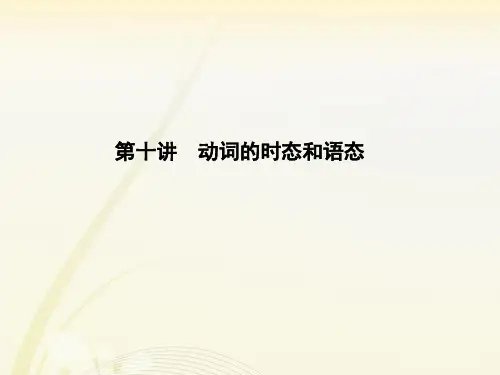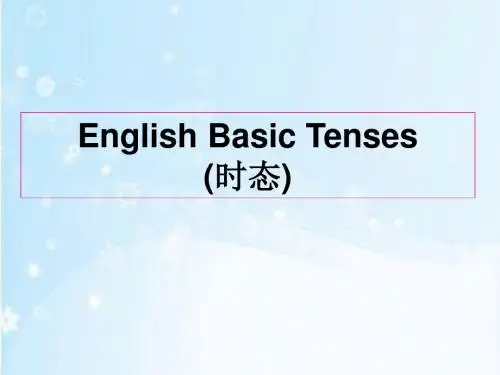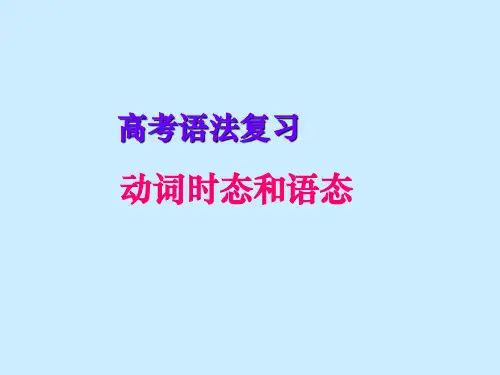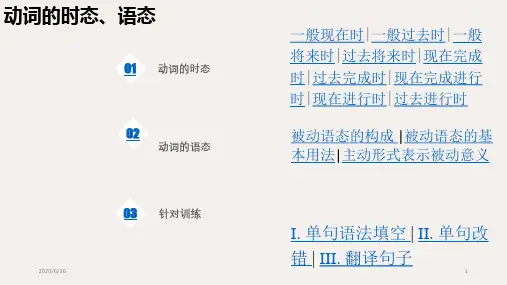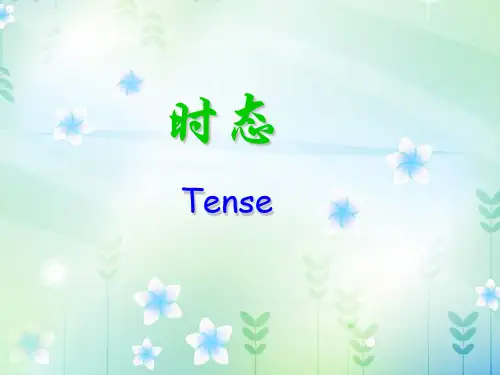- 1、下载文档前请自行甄别文档内容的完整性,平台不提供额外的编辑、内容补充、找答案等附加服务。
- 2、"仅部分预览"的文档,不可在线预览部分如存在完整性等问题,可反馈申请退款(可完整预览的文档不适用该条件!)。
- 3、如文档侵犯您的权益,请联系客服反馈,我们会尽快为您处理(人工客服工作时间:9:00-18:30)。
犹如
How will you spend your Spring Festival holiday? I will… I’m going to…
三. 一般将来时( The Simple Future Tense )
1. will / be going to do 2. be +to do,按计划或正式安排将发生的事。 We are to have an exam this week. 3. be about to do, 表示马上做某事, 不能与明确 表示将来的时间状语连用.
与表示延续性的时间状语连用,如:so far, up to now, recently, in the past 6 years, since…, for … 等等. I have lived in Zhuhai for 3 years.
2).表示发生在过去的某一动作对现在造成的影响 或结果,常用的时间状语有: just ,already, yet, ever, never, once等等.
last summer.
8. Lily said she __w_o_u__ld_ (put) on the new dress
the next day.
Dad told me (that) hew__o_u_l_d_b__u_y (buy) a
computer for me if I could pass the exam.
.过去将来时(The past future simple Tense)
1. 用法: 过去将来时表示立足于过去某一时间看 将要发生的动作或存在的状态, 常用于宾语从句 中. 2.结构: 1)Should / would+动词原形
一.一般过去时 ( The Simple Past Tense )
1.结构: 谓动用动词过去式
2.用法: 在过去时间里所发生的动作或存在的 状态。常与表示过去时间的时间状语连用。 如 yesterday, last week, an hour ago, in 1982等。
How is your daily life as a high school student?
3) 表示已安排或计划好将来必定会发生的动作 或存在的状态, 一般用于be, come, go, start, begin, leave, arrive, return等动词中,常与时 间状语连用.如:
The meeting starts at 2:00 p.m.
Dad said to me, “I will buy a computer for you if you can pass the exam.”
On August 8, 2008, the 29th Olimpic Games was opening in Beijing.
What were you doing on that day?
五. 过去进行时(The Past Continuous Tense)
1. 结构:was/ were + doing 2. 用法:表示过去某时或某段时间正在进行的动
internet?
5. He fell asleep while he w__a_s_r_e_a_d__in__g (read) a
book.
6. I ___h_a_v_e__ never __h_e_a_r_d_ (hear) of that man
before.
7. My brother often ___w__e_n_t__ (go) for walks
作或状态。常用的时间状语 at ten yesterday, from nine to ten last evening, when…, while…
English, boring or funny?
Q1: How old were you when you first started learning English?
• since +时间点, 用来说明动作起始时间 • for+ 时间段, 用来说明动作延续时间长度。
I have lived here for more than twenty years. I have lived here since I was born..
You graduated (毕业) from Junior Middle School in July 2009. You had stayed there for 3 years when you graduated.
1.结构: 主语为第三人称单数,谓动要变化,其
余人称用原形.
Hale Waihona Puke 2. 用法: 1) 经常性或习惯性的动作,常与表示频率的时
间状语连用,如often/ usually, every…, sometimes, at…, on Sunday。
2)表示不受时间限制的科学事实或客观真理。 The earth moves around the sun.
How did you spend your childhood?
(3 sentences or more,使用实意动 词和系动词, 注意动词形式变化)
Example:
I __s_p_e_n_t_ (spend) my childhood happily with my old friends. We always _p_l_a_y_e_d__(play) football and basketball together and we _d_i_d_n_’_t_ (not) have so much homework to do as now. We ___w_e__re_ (be) happy at that time.
We have finished our lunch already. Have you ever tried this method?
比较一般过去时与现在完成时
1). 一般过去时只表示发生在过去的动作或存 在的状态, 不涉及对现在的影响;现在完成 时表示发生在过去的动作或状态一直延续到 现在,或强调过去的事情对现在的造成的影响。
一般现在时 ( The Simple Present tense 一般过去时 ( The Simple Past Tense ) 现在进行时(The Present Continuous Tense)
过去进行时(The Past Continuous Tense)
现在完成时(The Present Perfect Tense) 过去完成时 (The Past Perfect Tense) 一般将来时( The Simple Future Tense ) 过去将来时(The Simple Past Future Tense)
My family lived in Zhuhai ten years ago. (现在不在了)
My family have lived in Zhuhai for 10 years. (目前还在珠海)
2). 过去时常与具体的表示过去的时间状语连用, 而现在完成时通常与不确定的或包括现在在内 的时间状语连用,或无时间状语.
He is about to leave for Beijing.
What are they doing now? They are having a class.
四. 现在进行时(The Present Continuous Tense
1.结构: be (am, are, is)+ doing 2. 用法:
English Basic Tenses (时态)
他昨天来了. He came yesterday. 他已经来了. He has come. 他明天来. He will come tomorrow.
汉语借助词汇手段而非词的形态变化来表示 动作的发生,而英语主要通过谓语动词时态 变化来表现.任何句子都要先注意时态.
注意:
非延续性动词的否定形式可以与表示延续时间 的状语连用。即动作不发生的状态是可以持续 的。
I have received his letter for a month. (错) I haven't received his letter for almost a month. (对)
比较since和for
七.过去完成时 (The past perfect Tense)
1. 结构: had + 过去分词 2. 概念:表示过去的过去
----|--------------|---------|----> 过去之前 过去 现在 将来
When the police arrived, the thieves _h_a_d__r_u_n__a_w__a_y____(run away).
(3 sentences or more,使用实意动词和系动词, 注意动词形式变化)
I study hard every day and I get along well with my classmates, but sometimes I miss my families.
二. 一般现在时 ( The Present Indefinite )
When I came into the classroom, my dear studentsh_a__d_b__e_g_u_n_____ (begin) reading.
Exercises
1. I usually _g_e_t_ up at 6:00, but yesterday I __g_o_t__ up at 7:00 and tomorrow I _w__il_l__g_e_t_
The boy promised he would work hard. I told my parents I should return early.
